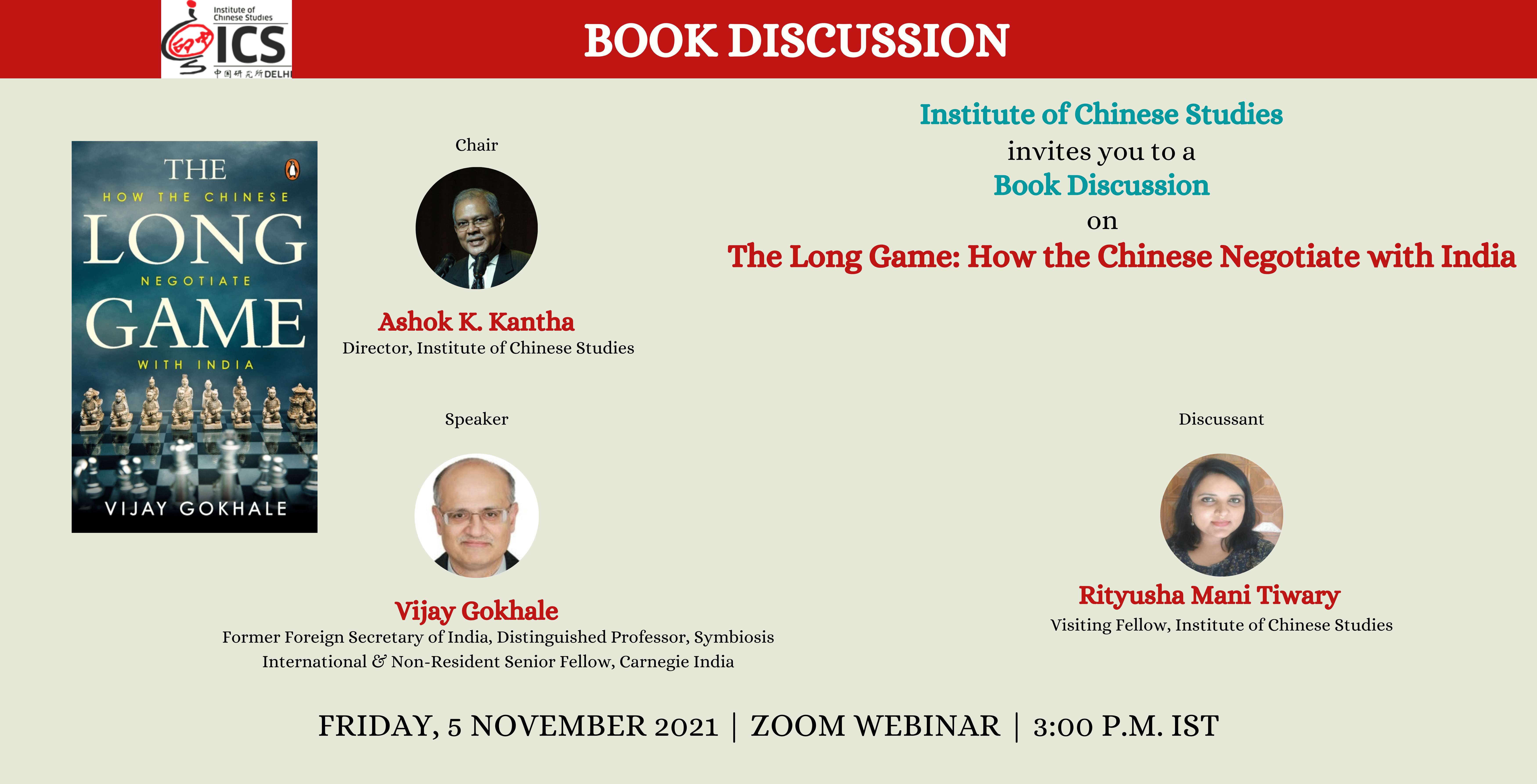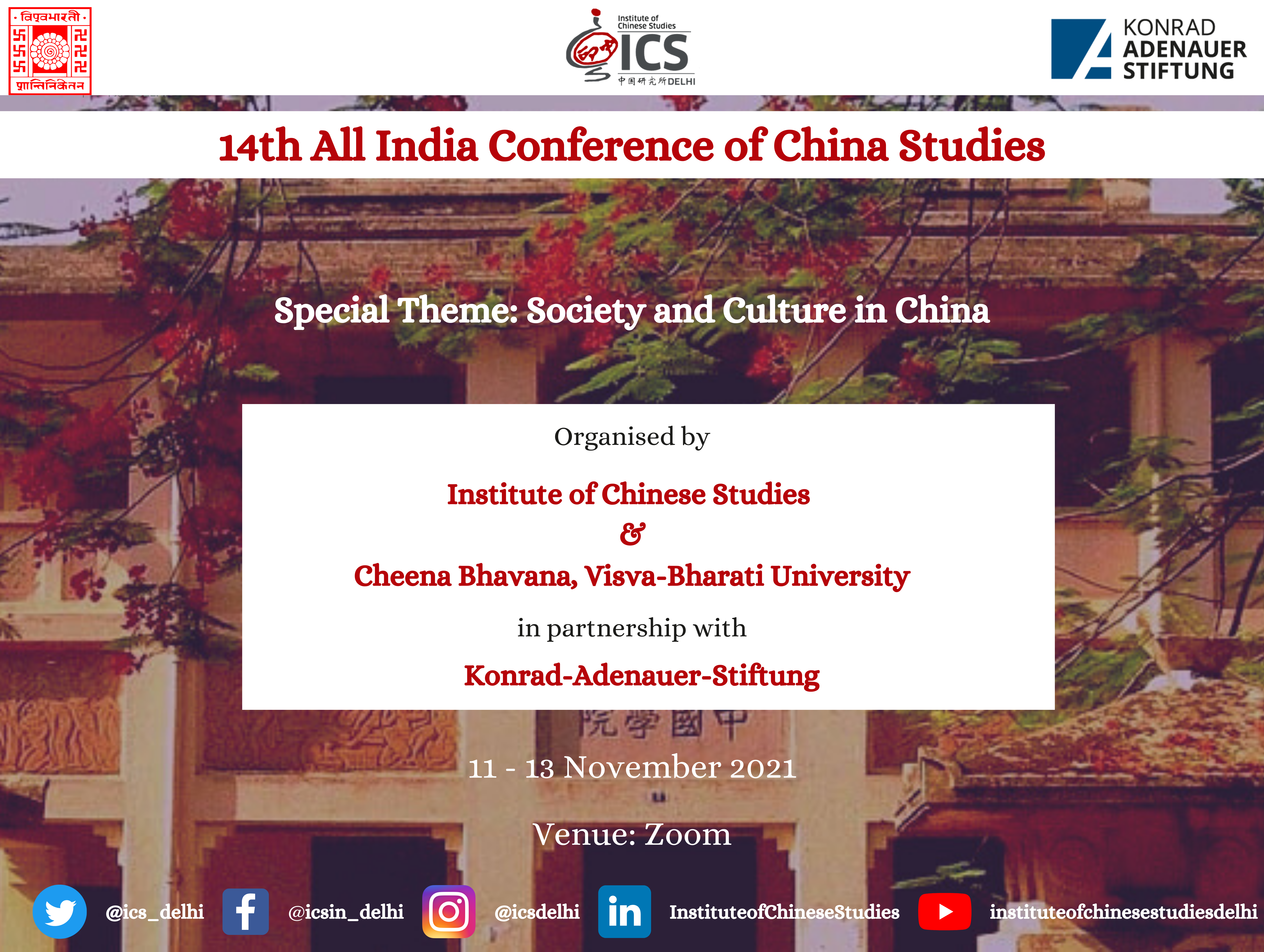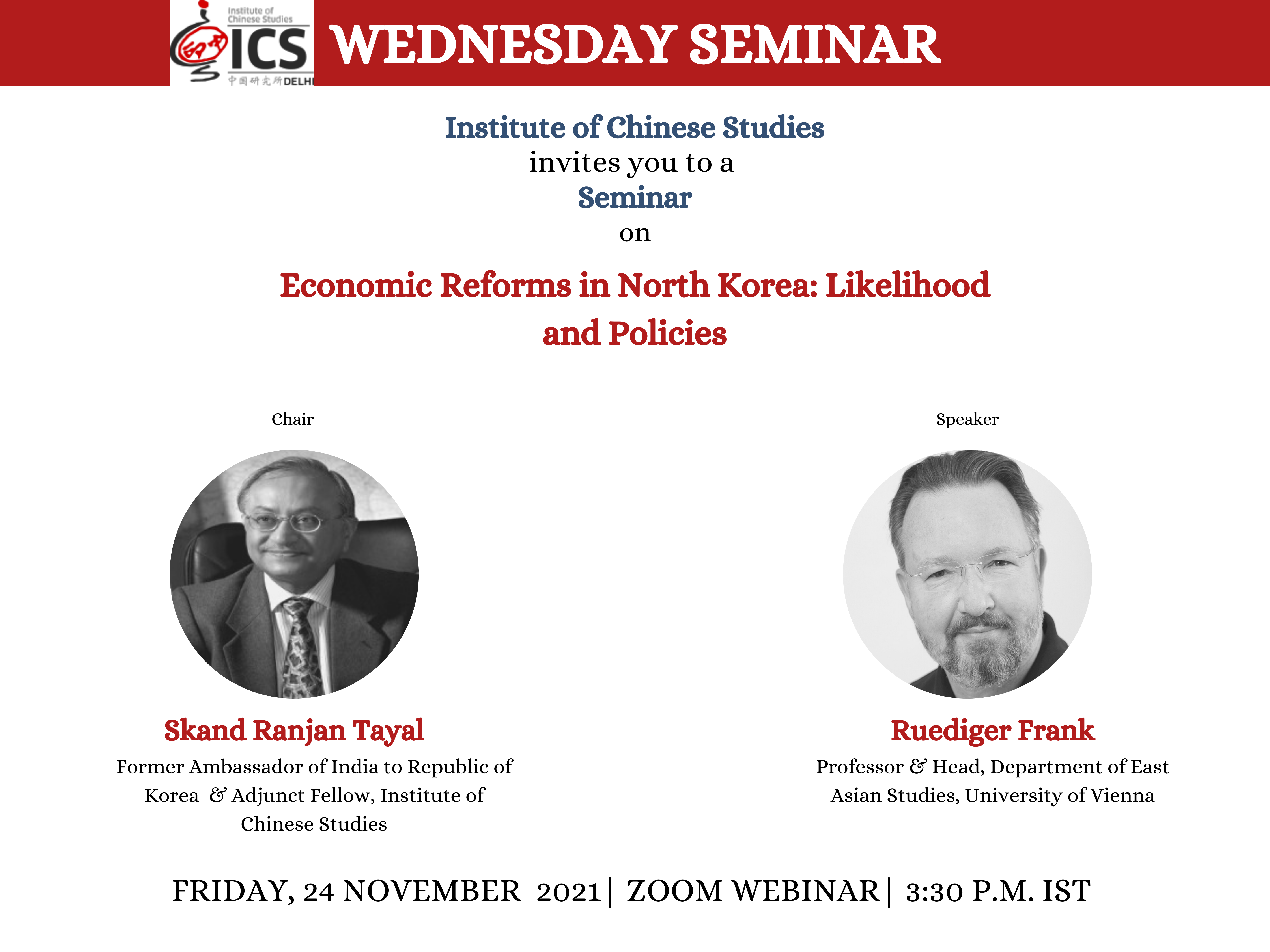 |
| |
| Book Discussion: The Long Game: How the Chinese Negotiate with India |
|
Vijay Gokhale
Book Discussion | Zoom Webinar |5 November 2021
|
| |
|
In his recent book, The Long Game: How the Chinese Negotiate with India, the author, Shri Vijay Gokhale focuses on six case studies of India-China negotiations that span the entire period from 1949 to 2019 and draws certain conclusions about the methods that China adopts and tools that China uses in the negotiation process with India. The book is intended to introduce the topic to ordinary people who are interested in India-China relations and foreign policy issues. Shri Gokhale spoke about the broad factors that shaped China's approach to negotiations, the different approaches that India and China adopted during the negotiations and the manner in which the perceptions that each has about the other has shaped the approach to negotiations. This book discussion intended to simplify the understanding of Chinese negotiating strategy and tactics and gather a further understanding of the book from the author itself.
|
| Listen> |
|
|
 |
| |
| 14th All India Conference of China Studies |
|
AICCS | Zoom Webinar | 11-13 November 2021
|
| |
|
The All India Conference of China Studies (AICCS) is the flagship event of the ICS, convened annually, with the principal objective of spreading interest in and strengthening research on China and East Asian Studies in India. The 14th AICCS was held in collaboration with Cheena Bhavana, Visva-Bharati University and in partnership with Konrad-Adenauer-Stiftung. Each conference has a special theme, and this year's theme focused on "Society and Culture in China". The Keynote Address was delivered by Shivshankar Menon, Visiting Professor of International Relations, Ashoka University and Chairman, Advisory Board, Institute of Chinese Studies, New Delhi.
|
| |
|
|
.png) |
| |
| Dangers of a US-China Military Conflict: Escalating Geopolitical Rivalry with No Exit Ramp? |
|
Shyam Saran, Joseph Gerson, Da Wei, Zhiqun Zhu, Kanti Bajpai
Wednesday Seminar | Zoom Webinar |17 November 2021
|
| |
|
In the US media, as also in the global press, leading headlines in the past few days have been “A US-China clash is not unthinkable”, “The US could stumble into a nuclear war with China over Taiwan” and “America would defend Taiwan against a Chinese assault.” On the other hand, the People’s Republic of China has not been far behind in spitting out war-like rhetoric. The headlines in the leading state-controlled media in China have been “Why US will lose a war with China over Taiwan island”, “U.S. is shutting door for talks, and not prepared for Consequence” and “Upping tensions over Taiwan shows US is an irresponsible power.” So, why has Taiwan become an explosive flashpoint for a US-China war? Arguably, Obama’s “pivot to Asia”, Trump’s “all-out anti-China policies,” and the current US administration’s “New Cold War against China” spearheaded by President Biden have all been driven by the historic decline of US hegemony. China, on its part, has not been shying away from a confrontationist US either. Not only has China steadily built up Chinese military bases in the South China Sea and has successfully tested both medium-range and intercontinental hypersonic missiles, it has also increased the frequency of flying sorties near the Taiwanese airspace. Moreover, China’s “stubborn” ignorance of external criticisms of clamping down on dissidents, putting over a million Uyghurs into “re-education camps” and crushing peaceful democracy protests in Hong Kong – haven’t won Beijing one additional supporter abroad. Furthermore, China has condemned the attitude of the US for its return to the “Cold War mindset”. The world’s appeal to a coercive Biden and an aggressive Xi Jinping is not going to help us avert the dangers of war. What we really need is to build a powerful world opinion to reduce the risk of a military conflict between the world’s largest and second-largest economies, both nuclear-armed. This seminar shed light on all these issues.
|
| Watch> |
|
| |
 |
| |
| Economic Reforms in North Korea: Likelihood and Policies |
|
Ruediger Frank
Wednesday Seminar | Zoom Webinar |24 November 2021
|
| |
|
The DPRK, or North Korea, has in the past two decades become a major issue of concern due to its geostrategic importance, its possession of nuclear weapons and the resulting direct and indirect threats for regional security, and due to humanitarian and human rights issues. As of 2021, the country is dealing with a long-term structural crisis of its inefficient state-socialist economy, the mid-term effects of economic sanctions that went from specific to comprehensive, and the short-term effects of the Covid-pandemic and related restrictions. Other state-socialist systems like those of China, Vietnam and the Soviet Union have responded to similar challenges by embarking on a path of reform, with different approaches and results. North Korea, despite having experimented with elements of a more liberal approach since the late 1990s, has so far not announced a deep and broad economic reform program. This talk addressed the question of how to increase the likelihood of a deep and broad economic reform drive in North Korea. Rather than doing so based on an ad-hoc interpretation of isolated events or randomly available data, it attempted to take a systematic approach. The CRE model helps to break down a very broad question into smaller, more precise tasks. Efforts directed at the elite and the middle class, and aimed at increasing perceived gains from reforms and losses from non-reforms, are the most promising measures. This shed a new light on various policies applied by the West including economic sanctions and summitry with the top leader, and helps explain the rationale behind current North Korean policies such as inward-orientation and fight against cultural infiltration.
|
| Listen> |
|
|
|
|
|
 |
.png) |
| CHINA REPORT |
| Volume 57| Issue 4 | November 2021 |
| |
| Read more >> |
|
|
 |
| ICS Analysis |
| |
China’s ‘Leading Small Groups’: Instruments of Governance and Control
|
| Kishan S. Rana | Issue No: 141 | November 2021 |
| |
| In the unique conjoined system of Party-State that China operates (with the Party the dominant player), Leading Small Groups, LSGs, are a governance device dating to the Ya’anan days of the 1930s. They have been extensively used for a long time, to control both decision-making and execution of decisions. Bringing to one table all the Party, Government, Provincial and PLA entities involved, they have smoothened governance and policy execution. The new development in recent years is that they have assumed a hierarchical role. They also appear to represent a new way of dealing with governance, strengthening President Xi Jinping’s personal control over policy-making and execution process. |
| Read more >> |
|
|
 |
| ICS Analysis |
| |
Women in China: “Baby Makers” and “Bed Warmers”?
|
| Hemant Adlakha| Issue No: 142 | November 2021 |
| |
| From the country’s Marriage Law – the very first legislation passed in the 1950s in New China – to the long-awaited Civil Code passed last year, gender equality and the freedom to marry or not to marry are legally guaranteed rights in the People’s Republic of China. In a recent study published in China, nearly half the number of women who participated in the survey do not want to get married. Yet, the policy makers at least in one of the provinces have decided to “encourage” young women to not leave their hometowns and become “baby makers” and “bring warmth” to the beds of unmarried, aging rural men. |
| Read more >> |
|
|
 |
| ICS Analysis |
| |
Legalism sugar-coated with Confucianism – from Qin and Han dynasty – Has this tradition continued in CCP way of ruling?
|
| Animesh Jain | Issue No: 143 | November 2021 |
| |
| As an observer of contemporary China, it is easy to recognize the extent to which the current party- state under the leadership of Xi Jinping uses history to justify a vast range of its policies, from Tibet and Xinjiang, to Taiwan, South China Sea and the Belt and Road Initiative (BRI). As the People’s Republic of China (PRC) continues to rise on the global stage, its leadership and supporters have become increasingly prone to advocating the idea of a “China model” that links its political system to its long standing cultural traditions. In this paper, I will discuss how the PRC has continued the Qin-Han polity which is Legalism sugar-coated with Confucianism. In history, this system of polity started taking shape with the creation of the short-lived Qin Empire (221–207 BC), and then reconstructed, completed and legitimized during the Han Empire (202 BC–220 AD). |
| Read more >> |
|
|
 |
| ICS OCCASIONAL PAPERS |
| |
Reason and Ethical Decision-making in Korea and India
|
| Vyjayanti Raghavan| Issue No. 79 | November 2021 |
| |
| When confronted with the question of decision making in any circumstance, very often, human beings have various alternatives to evaluate and choose from. This process involves, firstly, being aware of the various alternative options and their consequences, then weighing and evaluating them and finally, choosing the best option and implementing it. This is where the question of ethical decision making comes in, which requires eliminating the unethical options. What aids a person in making ethical decisions? Herein lies the issue of the process of reasoning, as much as the conditioning of the mind at arriving at ethical decisions. |
| Read more >> |
|
|
 |
| ICS OCCASIONAL PAPERS |
| |
Democratisation in Oceania and its Impact on China’s Influence on the Region
|
| Wonchibeni Patton | Issue No: 80 | November 2021 |
| |
| The People's Republic of China (PRC) is the third-largest aid donor to the South Pacific region. There are 14 Pacific Island Countries (PICs) in the region, excluding Australia and New Zealand. These countries underwent decolonisation from the 1960s to the 1990s, and the PRC began establishing diplomatic relations with them from 1975 onwards. Today, Beijing is recognised by ten PICs, while the remaining four share diplomatic ties with Taiwan. The political culture in the PICs is still evolving, and their still developing democratic tradition might provide a suitable opportunity for the PRC to amplify its growing influence in the region. This paper investigates the same by examining the democratic cultures in the region's top three recipients of Chinese aid- Papua New Guinea, Samoa and the Fiji Islands. |
| Read more >> |
|
|
| |
|
|
|





